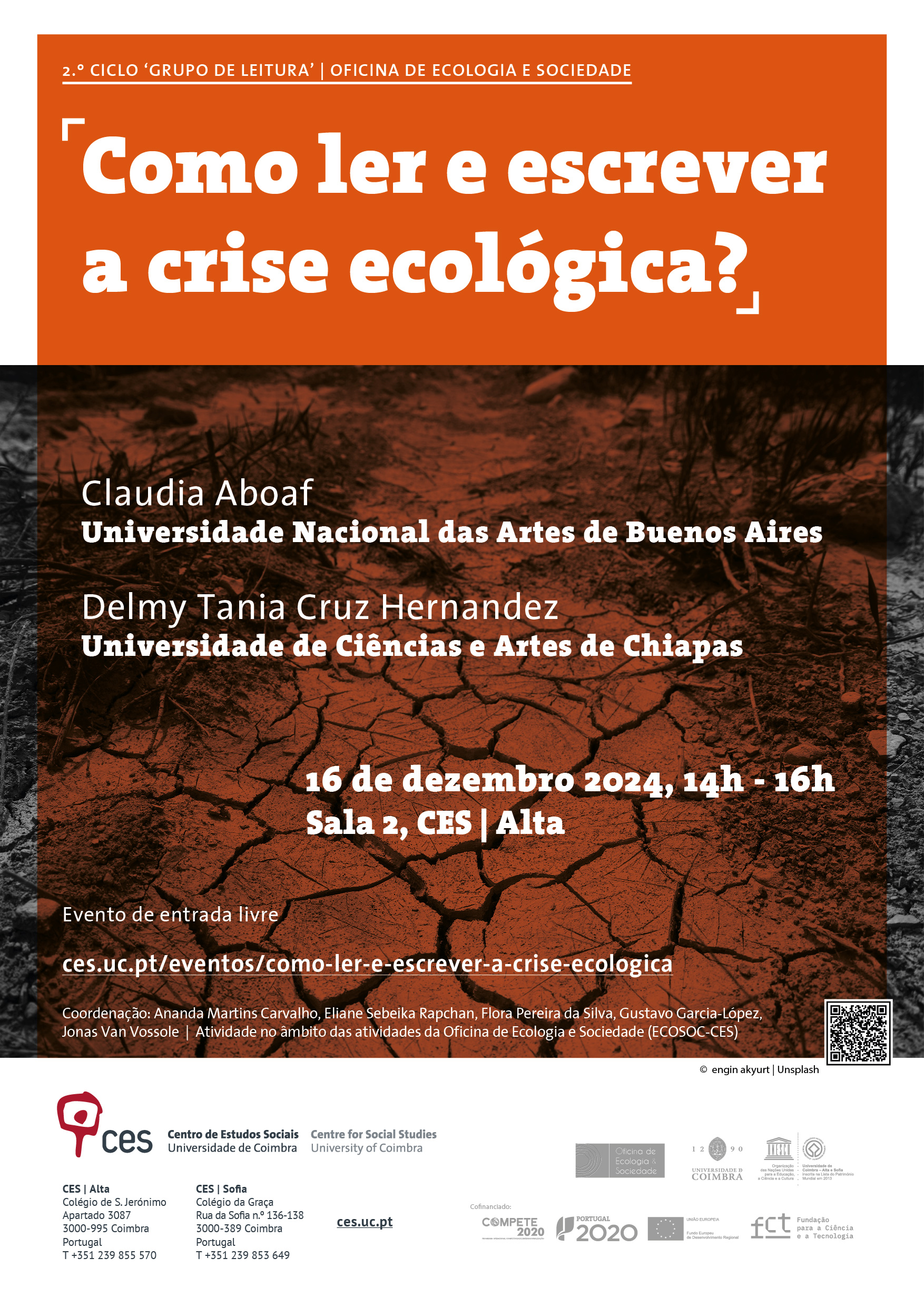Political Ecology Reading Group | Final section
How to read and write about the ecological crisis?
December 16, 2024, 10h00-12h00 | 14h00-16h00
Room 2, CES | Alta
To close the Reading Group's year of activities, we will hold two sessions on December 16: an internal evaluation session with the series' participants and a panel open to the community.
10h00 - 12h00: How to read and write about the ecological crisis? A methodological (and life-changing) evaluation of the reading group and celebratory dinner
We will have an internal moment with those who were part of this reading cycle to look at the work from a theoretical-methodological point of view. We will hold a discussion group to evaluate what was done during the last year and to reflect on the contributions that the readings have brought to our research and also to our lives beyond the academic space. We will end the day with a collective dinner for those in Coimbra. Participants will receive information about fees and registration by email.
14h00 - 16h00: How to read and write about the ecological crisis? Open conversation with authors
To celebrate one year of the Reading Group's activities, we will hold a roundtable, bringing some of the authors studied and inviting them to reflect on the meanings and possible paths for writing and reading about the climate crisis. At this meeting, which marks the end of the Reading Group's first year, we will have the presence of guests whose texts were discussed during the sessions, highlighting the relevance and celebrating the encounter with their work. The goal is to address what authors have provoked in our senses and actions, what they represent in our academic and professional paths, and as compasses that inspire our life trajectories.
There will be presentations by two authors who work on different themes in our series: Claudia Aboaf, an author and professor of climate science fiction at the Universidad Nacional de las Artes in Buenos Aires, Argentina, and Delmy Tania Cruz Hernandez, an educator and activist in community and decolonial feminist political ecology, and a professor at the Universidad de las Ciencias y las Artes in Chiapas, Mexico.
Bio notes
Claudia Aboaf is an author and professor of climate science fiction at UNA, Universidad Nacional de las Artes. She has published the novels Pichonas (2014), El Rey del agua (2016) and El ojo y la Flor (2019) with Alfaguara. The last three novels make up La Trilogia del Agua (2024), published by Alfaguara. In essay, Astrología y Literatura: Diálogos Cósmicos entre Borges y Xul Solar y Silvina Ocampo y Pizarnik [Astrology and Literature: Cosmic Dialogues between Borges and Xul Solar and Silvina Ocampo and Pizarnik] by Editorial Lumen. Aboaf has also written stories in Argentinian and foreign anthologies, New Weird, Science Fiction and Genre. She collaborates in national and international newspapers with socio-environmental articles.
Delmy Tania Cruz Hernandez is a feminist, anti-racist, popular educator, ecologist from the South, animalist and accompanies processes of women defending their territories, as well as being a feminist activist from below and to the left. She is a doctoral student in social anthropology at the Centro de Investigaciones y Estudios Superiores en Antropología Social (Ciesas-Mexico), coordinator of the Pedagogy of the Subject Programme at the Centro de Estudios para el Desarrollo Rural (Cesder-Puebla) and a member of the Mujeres Transformando Mundos movement in Chiapas, Mexico. She is one of the coordinators of Clacso's Working Group on Bodies, Territories and Feminisms and a member of the Collective on Critical Views of the Territory from a Feminist Perspective.
Coordination: Ananda Martins Carvalho, Eliane Sebeika Rapchan, Flora Pereira da Silva, Gustavo García-López, Jonas Van Vossole


